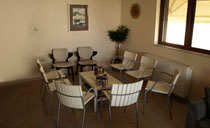One of the first stages in the evolution of a Group Psychotherapy session is the cultivation and development of trust between the members.If this is achieved, the amount of help one can receive is enormous.
Characteristics cultivated in Group Psychotherapy include the innate human need to belong somewhere, e.g. in a Group.At the same time the individuality of each person is maintained.The ascertainment that the individual’s difficulties can have common characteristics with other members of the Group makes the burden surmountable.In the Group empathy* is cultivated, as well as development of socialization and the management of sentiments.
 Participation usually ranges between 5 and 10 individuals and sessions are held on weekly basis.
Participation usually ranges between 5 and 10 individuals and sessions are held on weekly basis.














